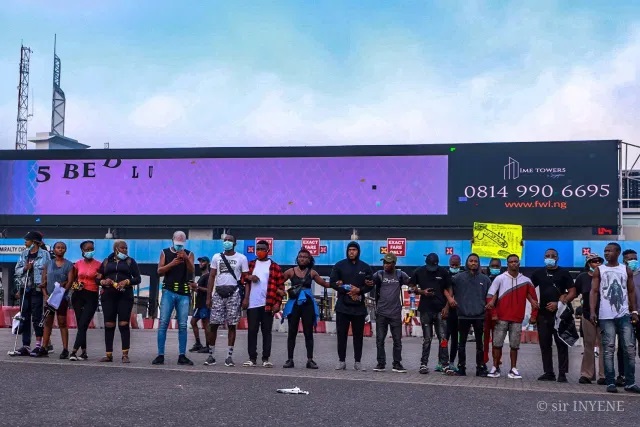#EndSARS: Taming lawless enforcement of the law
Al-Mawardi, the medieval Muslim theologian and jurist, identified six elements or necessities without which life on earth would be worse than that in the jungle. Remember, life in the jungle is predicated upon one principle and one principle only – eat or be eaten. Thus, according to al-Marwadi in Adab al-Din wa al-Dunya, the first […]

ENDSARS protest in Lagos
Al-Mawardi, the medieval Muslim theologian and jurist, identified six elements or necessities without which life on earth would be worse than that in the jungle. Remember, life in the jungle is predicated upon one principle and one principle only – eat or be eaten. Thus, according to al-Marwadi in Adab al-Din wa al-Dunya, the first necessity for the good life that man seeks and desires on a daily basis are the following- authority of faith that is hinged on eternal divine guidance, establishment of the authority of a Sultan or the president or a sovereign whose philosophy is justice and, for our purpose here, security of life and properties. Muslim jurists are all in agreement that wherever justice becomes a rarity, brigandage and thuggery becomes the order of the day; whenever pillars of safety and security are unhinged, life on earth becomes simply impossible.
But the irony of human life is such that the tendency to engage in evil and to commit crime partakes of the unknowable credo of homo sapiens. In other words, even in climes and times of prosperity and comfort, the temptation to commit infractions, to lust after what belongs to others, to steal, to kill, to maim and to infract divine ordinances is usually irresistible. Do you not always wonder that even when notices are given that Close-Circuit Television (CCTV) cameras are on in shopping malls and other public places, some still engage in shoplifting and petty theft. Should you wonder at all that despite our awareness that angels have been appointed to watch over our actions here on earth, humans still conduct themselves as if the Almighty does not or rather cannot see them. Human history exemplifies that uncanny fact that the most tasteful of all fruits is that which is forbidden.
Thus, when public agitations against the Special Anti-Robbery Squad (SARS) broke out during the last one week, I seized the moment to review what our heritage has to offer in regard to policing human societies. Ideas about the police system had long been found in Islamic annals since the time of the Prophet (s.a.w). The second Caliph, Umar bn al-Khattab, was the chief police officer of the Caliphate during his reign. He was in the habit of patrolling the city of Madinah at night as a way of looking after the welfare of the citizenry.
In the early Islamic period, the police unit was affiliated to the judiciary, with the main objective of implementing penalties usually issued by the judge. Later, it became independent from the judiciary and the chief of police, known as Sahib al-Shurtah, was in charge of examining offences. Under the Umayyad rulers, the police system witnessed radical changes and improvement. Mu`awiyah bn Abi Sufyan recruited more police members and developed its system.
He introduced what came to be known as ‘bodyguards’ apparently in response to the assassination of Caliphs Uthman bn Affan and Ali bn Abi Talib. Thus under him, the police became a tool for the implementation of the caliph’s orders. Sometimes, the position of the chief of police (Sahib al-Shurtah) was so sensitive that some princes and viceroys held it.
But more relevant here however are the qualities expected of police officers in Islamic annals. Under the Umayyads, strict criteria were set for membership of the police force. Ziyad ibn Abih said: “A chief of police must be firm in authority and watchful. A chief of guard must be bold, chaste, and honest.” When al-Hajjaj bn Yusuf al-Thaqafi, the viceroy of Iraq and Hijaz wanted to fill the position of the commander of the police force. he consulted with the notables and the elite among people, who in turn asked him: “What men do you want?” He said: “I want a man, who sits for a long time (tolerant), honest, free of dishonesty, keen on the least of right, and does not accept any intercession from any one no matter how noble he is”. It was said to him: “It is `Abdul-Rahman ibn Obayd al-Tamimy.” So al-Hajjaj issued instructions that al-Tamimy be brought to his presence. However, when the latter heard what the governor wanted him to do, he said: “I can’t accept it unless you prevent your children and entourage from interfering in my work.”
In addition to their duty of providing security, police officers sometimes known as Hisbah were also saddled with the task of maintaining public morality.
The agitation since the past one week over the excesses of members of the SARS therefore find ample patronage in Islamic annals. But it must equally be noted that the Nigerian police, like all other arms of government, is facing a lot of challenges. Visit any police barracks particularly where junior officers live and are accommodated, you would wonder exactly how might Nigeria overcome the fundamental malaise assailing it. Let the agitation for reformation of SARS continue to enjoy patronage; but there are other crimes government need to end- particularly poverty.
